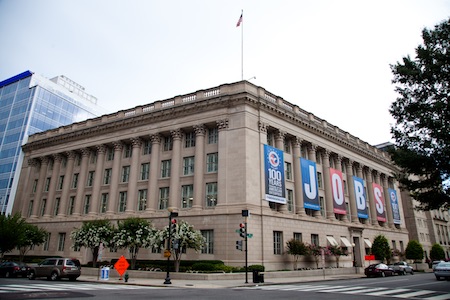“The letter urged governments to remove unnecessary supply chain barriers, including certain regulatory requirements, taxes, tariffs, export bans, stockpiling and distribution burdens, in order to facilitate the distribution of COVID-19 technologies and to prepare for the quick and efficient distribution of approved treatments and vaccines when they become available.”
On July 16, 2020, the U.S. Chamber of Commerce and national business associations of the UK, France, Germany, Korea, and Canada, published an Open Letter to Heads of States and Government leaders titled “Working Together to Discover and Deliver Innovative and Creative Solutions to the Pandemic’s Challenges”.
According to Patrick Kilbride, Senior Vice President, Policy, Global Innovation Policy Center of the U.S. Chamber of Commerce:
The goal of the U.S. Chamber of Commerce in joining this multi-national letter was to highlight for global policymakers the importance of private sector innovation to beating the COVID-19 pandemic. Private sector innovators depend on reliable intellectual property rights to make long-term, high-risk, capital intensive investments in innovation. Those investments over many decades have built a pipeline of bio-pharmaceutical, telecommunications, and other technological capabilities that are available to implement now as we determine how best to address the pandemic. Success in the search for effective vaccines and therapies, the ability to stay connected, informed, and safe, and similarly the solutions to the next crisis down the road, all depend on intellectual property-enabled investment in innovation.

U.S. Chamber of Commerce
The letter highlighted the contributions made by businesses in response to COVID-19, noting that businesses have expended a considerable amount of time and resources to “accelerate the research, development and manufacture of protective equipment, advanced diagnostics, disinfection products, medical devices and potential treatments and vaccines.” In addition, the letter noted that governments, universities, foundations, non- profit entities and the private sector have been collaborating and sharing information and emphasized the importance of continued “all-of-society” efforts for the common purpose of winning the fight against COVID-19.
Explaining that many parts of the world are “almost certainly” entering a time of slowed economic growth, the letter urged governments to ensure that innovation-inducing policies are in place to provide “a stable intellectual property regime, targeted incentives for unmet medical needs, qualified scientific staff, research- and innovation-inducing tax systems and strong public research institutes.” Intellectual property protection has contributed to the rapid response to COVID-19 by facilitating collaboration in the development of treatments and vaccines and will continue to be important in the manufacturing and distribution of approved treatments and vaccines.
The letter also urged governments to remove unnecessary supply chain barriers, including certain regulatory requirements, taxes, tariffs, export bans, stockpiling and distribution burdens, in order to facilitate the distribution of COVID-19 technologies and to prepare for the quick and efficient distribution of approved treatments and vaccines when they become available. The letter stated “[w]e must not allow economic, regulatory, logistical and technical barriers to limit the reach of [future treatments and vaccines]” while also ensuring safe and effective solutions.
Additionally, the letter supported leveraging existing programs, such as the Medicines Patent Pool (MPP), to help facilitate the voluntary licensing of patented technologies. It also noted that any COVID-19 related initiatives that “seek or would require private sector participation must be developed in consultation with businesses, and industry must be fully represented as a partner.”
Finally, the letter explained that such initiatives should be limited to COVID-19 and should be clear and flexible to allow for changes as the pandemic evolves.

![[IPWatchdog Logo]](https://ipwatchdog.com/wp-content/themes/IPWatchdog%20-%202023/assets/images/temp/logo-small@2x.png)

![[Advertisement]](https://ipwatchdog.com/wp-content/uploads/2024/04/Artificial-Intelligence-2024-REPLAY-sidebar-700x500-corrected.jpg)
![[Advertisement]](https://ipwatchdog.com/wp-content/uploads/2024/04/UnitedLex-May-2-2024-sidebar-700x500-1.jpg)
![[Advertisement]](https://ipwatchdog.com/wp-content/uploads/2024/04/Patent-Litigation-Masters-2024-sidebar-700x500-1.jpg)

![[Advertisement]](https://ipwatchdog.com/wp-content/uploads/2021/12/WEBINAR-336-x-280-px.png)
![[Advertisement]](https://ipwatchdog.com/wp-content/uploads/2021/12/2021-Patent-Practice-on-Demand-recorded-Feb-2021-336-x-280.jpg)
![[Advertisement]](https://ipwatchdog.com/wp-content/uploads/2021/12/Ad-4-The-Invent-Patent-System™.png)






Join the Discussion
One comment so far.
MaxDrei
July 22, 2020 01:58 pmOne problem with a pandemic is that the virus is not fussy who it kills, whether “the rich man in his castle or the poor man at his gate” (or working in his kitchen). Setting access to medication and vaccines according to ability to pay is therefore sub-optimal to management of the disease.
Or am I barking up the wrong tree. What else is the US Chamber of Commerce driving at, when writing to these other countries busy developing vaccines?